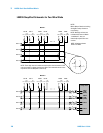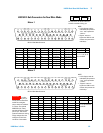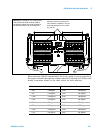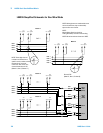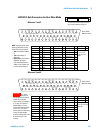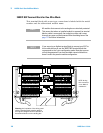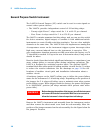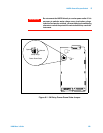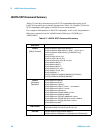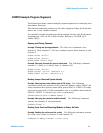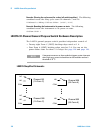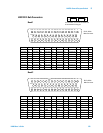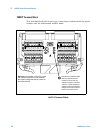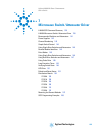
128 L4400 User’s Guide
6 L4437A General Purpose Switch
General Purpose Switch Instrument
The L4437A General Purpose (GP) switch can be used to route signals or
control other system devices.
• The L4437A provides independent control of 32 latching relays:
• Twenty-eight Form C relays rated for 1 A at 60 W per channel
• Four Form A relays rated for 5 A at 150 W per channel.
The L4437A contains armature- latching relays, and you can use the switch
for device actuation, digital output, or combine it with additional switch
instruments to create flexible switching topologies. You can close multiple
channels at the same time. The L4437A does not implement an analog bus.
A temperature sensor on the instrument triggers system interrupts when
high- carry current- induced heat on the instrument is excessive. This
over- temperature situation generates an SRQ event when the factory- set 70
o
C threshold is reached. It is up to the user to determine what, if any, action
should be taken.
Reactive loads (those that include significant inductance or capacitance) can
cause voltage spikes or current spikes during switching operations. The
L4437A is designed for switching reactive loads. The optional 34937T
terminal block has solder pads for adding snubber circuits for the 5 A relays
to reduce the reactive transients. See the drawings on page 134 for the
locations of snubber circuit pads and installation information about a
snubber circuit.
A hardware jumper on the L4437A allows you to define the power- failure
states for the instrument’s 5 A latching relays. Depending on the position of
the jumper, the 5 A relays will either open or maintain state when system
power failure occurs. When shipped from the factory, the power- fail jumper
is in “MAINTAIN” position (all relays maintain their present state when
power fails).
Remove the L4437A instrument sub- assembly from the instrument carrier
and then remove the sheet metal cover from the sub-assembly. Move the
position of the jumper mounted on the sub- assembly. See the figure below for
the jumper’s location.
WARNING
Before changing the position of the jumper, turn off the instrument
and remove all external connections. Wait five to ten seconds to
allow the instrument’s internal capacitors to discharge.



